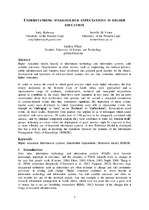| dc.description.abstract | Higher education invests heavily in information technology and information systems, with variable outcomes. Organisations in other sectors, such as engineering, the defence industry, public administration and business, have developed and adopted good practice for the choice, development and operation of software-based systems that are only sometimes understood in higher education.
In order to assess the extent to which good practice might assist higher education, the four tertiary institutions in the Western Cape of South Africa were approached and a representative range of academic, administrative, technical and managerial respondents agreed to contribute to the study. Interviews were organised in two parts: the first an open conversation about their involvement with systems, and the second a structured examination of systems-related events that they considered significant. By inspection of those events, bipolar scales were developed by which respondents were able to characterise events (for example as ‘challenging’ or ‘easy’, or as ‘functional’ or ‘dysfunctional’). Respondents rated events on those scales. Repertory Grid analysis was applied so as to investigate which scales correlated with event success. 30 scales (out of 170) proved to be adequately correlated with success, and by principal component analysis they were combined to form ten ‘success scale’ groups, indicating ten areas where the deployment of good practice might be expected to lead to more effective use of improved information systems. A new Reference Model is developed that has a role to play in resolving the transitions between the domains of the Information Management Body of Knowledge (IMBOK). | en_US |

